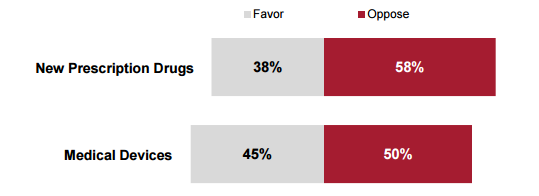Poll: 57% of Americans Want Drug Ads Gone from TV
Poll: 57% of Americans Want Drug Ads Gone from TV
What do you think?
Before coming to write for Natural Society, I worked for a national law firm. I primarily wrote about lawsuits, the majority of them concerning prescription drugs. It was there that I began to learn how dangerous many drugs can be , and how desperately the pharmaceutical industry wants the public to place blind trust in its products.
Boots Pharmaceuticals aired the very first prescription drug ad in the United States on May 19, 1983. It was for the pain reliever Rufen. Within 48 hours of it airing, the federal government ordered Boots to take it down . These days, you can hardly get through a 30-minute sitcom without seeing an ad for one drug or another. The U.S. is one of only two countries in the world that allow these ads. [1]
Drug companies are required to list the potential side effects of the drugs they advertise on TV; but the ads feature smiling faces, family barbecues, and attractive people enjoying vacations. It can be easy to miss the announcer’s voice listing the potential hazards, especially if you’re suffering from an illness the drug purports to treat.
Have you seen a Viagra ad lately? You’d think that if a guy pops a little blue pill, a gorgeous woman is going to appear out of thin air and seduce him.
Americans are getting sick of being treated as cash cows instead of human beings, and sick of watching serious prescription drugs being marketed like Cocoa Krispies ®. A Harvard University pollreleased last month shows the majority of Americans favor banning prescription drug ads on TV .
Before taking the poll, respondents were told that some people support banning the ads due to concerns that they can cause patients to ask their doctors for costlier drugs that may not be appropriate for them, and because drug prices are boosted by marketing costs. They were also told that other people believe that the ads inform patients better about treatment options.
After hearing arguments both for and against drug advertising on TV, 57% of poll-takerssaid they support removing prescription drug ads from the small screen. Only 39% of respondents opposed such a ban. The poll results had a margin of error of 5.1 percentage points. About 7% said they had considered taking a prescription drug they’d seen advertised on TV . Of that number, 76% said they believed that the ads clearly noted the side effects and risks associated with the drug. [2]These poll results come six months after the American Medical Association (AMA), the largest physicians’ group in the U.S., called for a ban on direct-to-consumer advertising of prescription drugs. The AMA also wanted a ban on such ads for medical devices.
Read: Composing Only 5% of the World Population, Americans Take 50% of All Pharmaceutical Drugs
According to the AMA, the increasing number of drug ads was “driving demand for expensive treatments” despite the fact that cheaper drugs are often just as effective.
Since 2013, spending on drug ads has increased 30%, to $4.5 billion .
In an e-mail to CNBC , Holly Campbell, a spokesperson for the leading pharmaceutical trade group PhRMA, said:
“Beyond increasing patient awareness of disease (including undiagnosed conditions) and available treatments, DTC advertising has been found to increase awareness of the benefits and risks of new medicines and encourage appropriate use of medicines.”
The poll also found that a majority of Americans are against the idea of speeding up the federal approval process for new prescription drugs. If several bills pending in Congress are passed and signed into law, the FDA could approve new drugs and get them on the market in a speedier fashion, which likely means fewer or shorter clinical trials.
| About Julie Fidler: | |
| Julie Fidler is a freelance writer, legal blogger, and the author of Adventures in Holy Matrimony: For Better or the Absolute Worst. She lives in Pennsylvania with her husband and two ridiculously spoiled cats. She occasionally pontificates onher blog. | |
Other Popular Stories:


Post a Comment